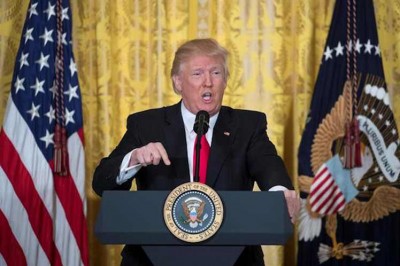Electoral Interference as Reality: A Long History of Manipulation, Bribery and Covert Ops

We should not forget the encouragement: hack those emails, extolled Donald J. Trump during the presidential campaign in 2016. It was the first public evocation of its sort, an invitation to a foreign power, in this case Russia, to indulge in cyber activity that has now been described by various US members of congress as “an act of war”.
The excitement has turned, less on the issue of what the material revealed – suitably damaging, impairing and even disabling of, for instance, the Clinton campaign – but the fact of hacking itself. US sovereignty, goes the cry, was breached.
The sense of many tears over spilt milk is hard to avoid. The whole dimension of influencing – or at the very least attempting to – electoral outcomes, has a long history. In the 1990s, the US election system faced outside influences – on that occasion from funding sources in China. Campaign financing, notably favouring the Democrats, became the hot topic of discussion. As with what took place in 2016, there was rage and indignation.
Sober voices suggested that some soul searching beyond the moral cant was in order. “China has done little more,” claimed Peter Kornbluh of the National Security Archive, an affiliate of George Washington University, “than emulate a long pattern of US manipulation, bribery and covert operations to influence the political trajectory of countless countries around the world.”[1]
When it comes to electoral interference, the United States can hold its own, whether through the soft power hands of the National Endowment for Democracy, or the more thuggish applications of the Central Intelligence Agency. In brute fashion, the US has swaggered imperially into and through state systems without much care. Even moderate stages of operation saw funding provided for the Solidarity movement in Poland in the 1980s, and various parties from Northern Ireland to Portugal.
During the Cold War, regimes were overthrown precisely because the electoral outcome was deemed undesirable to the stake holding power, or even too risky to entertain. Behind the screens and in the shadows of elections, local campaigns would also be shaped, funded and sabotaged. Local proxies were cultivated. The Soviets empowered their active intelligence arm, the KGB, to engage in aktivinyye meropriatia (“active measures”) rich with political warfare tactics to influence policy.[2]
The US, in mirror fashion, complemented such tactics, employing strategies of discrediting and targeting with similar feats of deception. More often than not, the trajectory disrupting target would be a rabble rousing populist, storming into the seat of government on the crest of a democratic wave.
The short of it is that both the United States and the United Kingdom, both states distinctly outraged by claims of Russian influence in both the UK election in 2015 and the US election a year later, were certainly, and avidly, doing their bit to transform and retard societies in the Middle East, Latin America and Africa, restoring ceremonially heavy monarchies, backing blood curdling despots and encouraging the nasty effects: murder, looting, carnage.
In the trophy cabinet of such meddling lie dark memories of the overthrow of Iran’s Prime Minister Mohammed Mossadegh in 1953, a process that led to the return of authoritarianism in the form of the Pahlavi dynasty. As the wheel turned in vengeance, the dynasty would fall to the religious populist outrage inspired by Ayatollah Khomeini.
To these ghastly exploits can be added the removal and murder of Congolese leader Patrice Lumumba in 1961, and the overthrow of Chile’s Salvador Allende in 1973 in what is remembered as that country’s September 11. Similar methods; similar bloody outcomes.
Economic and business imperatives were also dominant factors. In 1954, the strongarm gangster spirit of the United Fruit Co. (with direct interests with members of Congress), did Guatemala’s pro-agrarian and reformist Jacobo Arbenz in. Behind every nuisance of a democracy lurked the CIA, ready to pounce and strangle its quarry in the name of free enterprise.
The best, for last: allies, friends, who also wish to see their trajectory of history assured in the other country. After the outbreak of the Second World War, a threatened Britain was keen to push a pro-war line in the United States, initiating its own campaign through covert operations to get the candidates they wanted into a hostile Congress. Neutrality was the enemy.
This effort had, and here the word is appropriate, local collaborators, those scores, as Steve Usdin notes, “perhaps hundreds – of Americans who believed that fighting fascism justified unethical and, at times, illegal behaviour”.[3]
Usdin reminds us in salient fashion that Britain’s Secret Intelligence Services were adept at using their own variant of fake news and smear campaigns against candidates sympathetic to the “America First” line.
In 1999, a history commissioned by Canadian Sir William Stephenson, chief of British Security Coordination responsible or SIS operations in North and South America (1941-5), was declassified.[4] It revealed, in stark fashion, the extensive efforts made by Churchill’s government to intercept enemy communications, infiltrate labour unions and deploy radio and print propaganda sympathetic to Britain’s cause through the United States. Friends, indeed.
In the final analysis, electoral interference may not even net desirable results for the purported meddler. Beware the horse you back, not to mention the faecal blowback. Having Trump in the White House is certainly a different prospect from previous presidents, but Russia still faces the sanctions lobby in the State Department and an increased defence budget. A cursory appreciation of remarks by the US Ambassador to the United Nations, Nikki Haley, on the veto by Russia and China of new sanctions on Syria, would attest to that.[5]
Dr. Binoy Kampmark was a Commonwealth Scholar at Selwyn College, Cambridge. He lectures at RMIT University, Melbourne. Email: [email protected]
Notes
[1] http://www.nytimes.com/1997/03/31/us/political-meddling-by-outsiders-not-new-for-us.html
[2] http://www.prospectmagazine.co.uk/science-and-technology/active-measures-a-history-of-russian-interference-in-us-elections
[3] http://www.politico.com/magazine/story/2017/01/when-a-foreign-government-interfered-in-a-us-electionto-reelect-fdr-214634
[4] https://www.amazon.com/British-Security-Coordination-Intelligence-1940-1945/dp/088064236X/ref=sr_1_1?ie=UTF8&qid=1484169486&sr=8-1&keywords=british+security+coordination+history%20or%20http://www.worldcat.org/title/british-security-coordination-the-se
[5] http://www.scmp.com/news/world/middle-east/article/2075006/china-and-russia-veto-new-un-sanctions-syria-over-chemical

